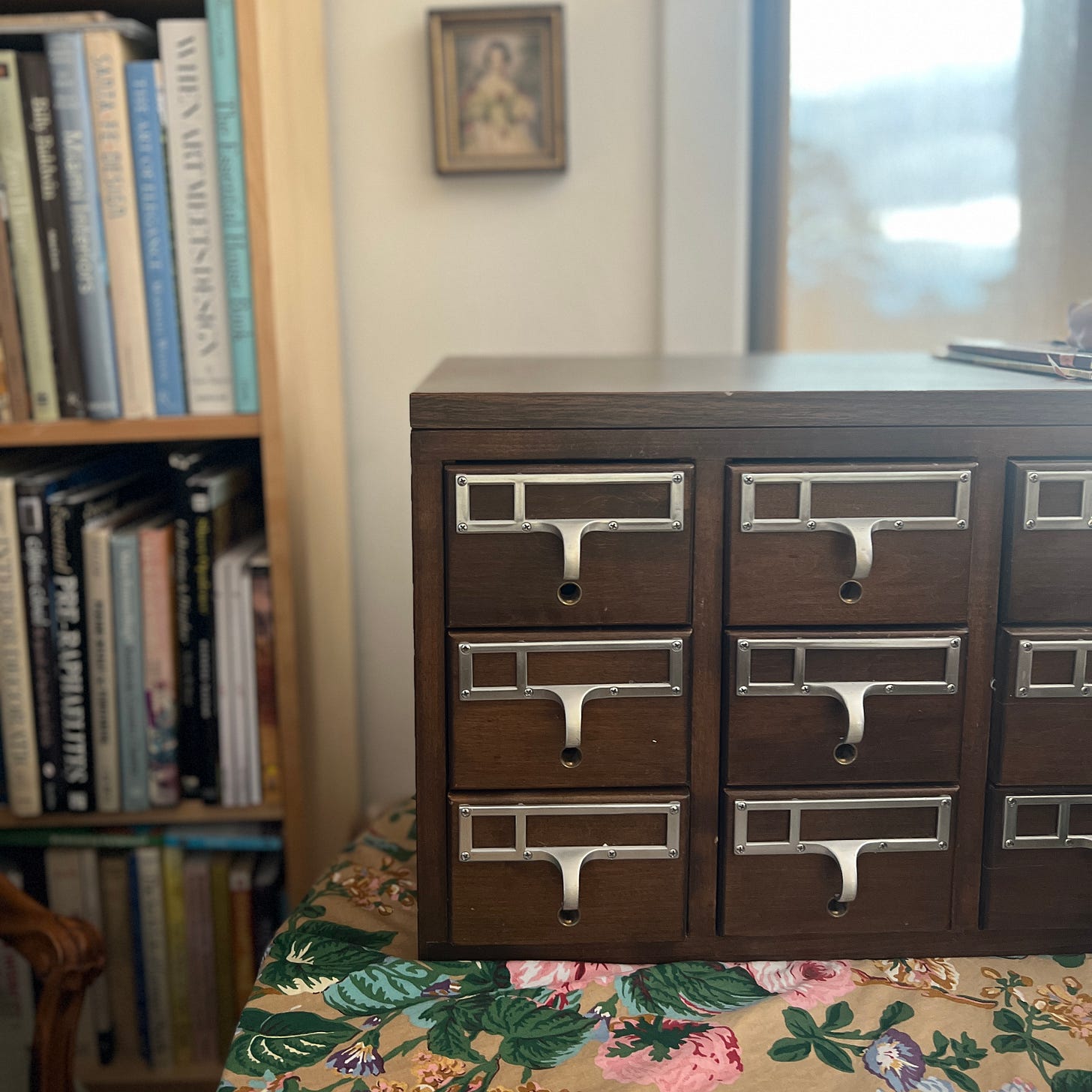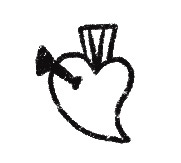Building a Personal Archiving Practice
As if I needed any more reasons to collect words, but here we are.
A bit of a re-brand for the new year! Previously Are You Shrieking?, it was time for a change. Hello to The Anchoress Archives!
We do not live by our memory; we make use of it to live. Record only what can help you to conceive or to execute, which can be assimilated into your soul, correspond to your objectives, vivify your inspiration, and bolster your work. As for the rest, consign it to oblivion.
A.D. Sertillanges, The Intellectual Life
Are you on ‘junk journal’ social media? Scrapbooking but make it hip, has infiltrated the collective consciousness of women of all ages, and it feels as if I can’t exist anywhere online without seeing someone giddily showing off their latest ‘spread.’ Receipts, torn labels from drink orders, menus, mailers, and other paper ephemera are paired with stickers and decorative papers, artfully arranged in Japanese sketchbooks, each page a joyful, color-soaked homage to daily life. I love it. I love to see the coffee shop receipt lovingly glue-sticked atop a glittering, patterned paper, wreathed with Hello Kitty stickers. As someone who strives to find beauty in the mundane, it’s very much my vibe. Some of these journals are purely visual, with each ‘spread’ as carefully arranged and curated as any oil painting, but my favorites are the ones with hand-written journal entries included. I love to see a girlish scrawl tucked into the negative space, the combination of written narrative and collage. What a beautiful way to map out a life, where even the trash has meaning.
It fits very well into a recent resurgence of memory collecting – commonplace books, journaltok, junk journaling, all the varied ways we magpie collect the stories of our lives and the words that have meaning. As an archivist, I approve. I can’t express enough how important these types of personal archives are to the historical record, how rich our historic archives are because of these collections of words. Especially when it comes to the voices of women – there would be an even larger gap than there already is if every generation of women didn’t have this urge to spill their guts on paper. Journals, correspondence, and scrapbooks all help to flesh out the human story of every era. Combined with collections of papers – newspaper clippings, memos, ephemera, and more – these personal archives help us to place these women in context and allow their voices to speak through the decades.
I love to see these trends, not only because I too am a magpie who loves a journal or notebook, but because archivists have been worried. The internet has changed everything about how we preserve and save and collect. The voices of the people are now online rather than on a physical object, and preservation becomes even more ephemeral. At any given moment, a website could go dark, access could be denied, or hard drives crash. As someone who has lost years of writing and collecting because of faulty technology, I know the personal heartbreak – but now I also view things through a professional lens and worry about the stories and voices we will lose as we rely solely on the cloud.
2025 will be my year of creating and maintaining a personal archive. In the last weeks of December, I set up a notebook system that I hope will sustain me throughout the year and beyond. I took the time to craft a beautiful, aesthetic cover that makes me happy each time I open it or see it sitting on my bedside table. I want the experience to be pleasurable from beginning to end, in the hopes that I will continue to sit down and write on the page. Morning pages, evening journals, research notebooks, commonplace books, each one has a specific purpose that contributes to the stories I want to tell about my interests and my life. It’s been so fun to plan this all out, and the idea of a drawer full of finished notebooks makes me immeasurably giddy with anticipation.
I am absolutely in love with the leather traveler’s journal portfolio that I made. It’s gone everywhere with me since I finished it.
I caught two, three oddities like butterflies from every book, and fixed them with ink in my scrapbook.
Jean Paul, 1796
Alongside this desire to document my own thoughts and ideas and lived experience comes the need to create a physical record of my research. I haven’t been able to get
’s newsletter about ‘research as a leisure activity’ out of my head since I first read it. It was the push that I needed to acknowledge how much pleasure I find in research for research’s sake, and to begin planning my own way of collecting and collating the products of that research.Several weeks ago a colleague asked if I wanted a card-catalog drawer cabinet that had been sitting unused in their garage – who better to ask than the archivist/librarian? I, of course, gave an enthusiastic yes. I’ve always loved card catalogs – I am old enough to remember the time before when they were still proudly positioned in libraries and available to explore. The early digital library catalogs were clunky, prone to glitches, expensive, and like a foreign language to patrons, but they were also a novelty. I can remember standing around waiting for a computer to free up and then finally slouching off to the card catalog, going back to the familiar tactile search of flicking through the cards. When I was in graduate school studying for my MLS, I was surprised by how much of that old cataloging language re-emerged from my memory – I felt like someone who hadn’t spoken their native tongue since childhood, overhearing a conversation and filled with a rush of nostalgia and familiarity.
I write all my findings on single little sheets, of which I make sixteen each from each sheet of paper. Now if I find something someplace, and I believe that it might serve me in the future…I copy it on a half octavo.
Johann Jacob Moser, 1701-1785
In the way things sometimes go, days after lugging the cabinet home and placing it temporarily in our front room, I stumbled across a reference to a card file personal archiving system known as a Zettelkasten. Popularized by German sociologist Niklas Luhmann in the mid-twentieth century, a Zettelkasten is an ancient form of personal knowledge management that was popular for centuries. It is a physical collection of ideas derived from personal research, copied onto paper cards and joined together by subjects and keywords to create a spider web of thoughts. Endlessly rich and customizable, it can then be mined for creative inspiration and become the framework for writing and projects. Card file systems are the inspiration behind hypertext software, wikis, and the internet as a whole, and the theories and practices are still being used with cloud-based note-taking applications such as Obsidian. But I am only interested in a Zettelkasten as a physical object – some people have called it an antinet – and have decided that in 2025 I will build my own.
There is a lot of commonality between commonplace books and a Zettelkasten – both are systems of collecting information, both often involve indexing. Modern Zettelkasten builders are often adamant that notes should be transcribed in the user's voice, showing that the information being referenced is now an idea that can be linked to other ideas within the system. But I am going to create my own archive, full of quotes, ideas, memories, and ephemera. I want to move my commonplace book into an even more physical manifestation: drawers of cards, like those long lost card catalogs of my childhood, full to the brim with words, both my own and the words of others. I want to be able to move through them, to see the thoughts I collect written down and mapped out in a complex, infinite web. And I want it to sit in the physical plane, not in the amorphous no-man’s land of the cloud.
Here’s to more physical media in 2025, including the media we create ourselves. I’ll be over here scribbling, spilling my guts, making lists, and touching paper, and some of that will make its way here, to be shared with you.
The list is the origin of culture. It's part of the history of art and literature. What does culture want? To make infinity comprehensible. It also wants to create order -- not always, but often. And how, as a human being, does one face infinity? How does one attempt to grasp the incomprehensible? Through lists, through catalogs, through collections in museums and through encyclopedias and dictionaries.
Umberto Eco
Some links:
'We Like Lists Because We Don't Want to Die': an interview with Italian novelist Umberto Eco on the place lists hold in the history of culture, the ways we try to avoid thinking about death and why Google is dangerous for young people.
Indexing, filing systems, and the art of finding what you have from
’s blog.I miss knowing what everyone's handwriting looks like.
Introduction to the Zettelkasten Method, from zettalkasten.de.
How to Take Smart Notes by Sonke Ahrens.
The r/Zettelkasten subreddit is a wealth of information, especially if you are interested in a digital or hybrid system. I have found good info there for physical systems, too.
Did you enjoy this piece?
If you haven’t already, please consider subscribing! And if you are a subscriber (hi, I love you!), maybe consider upgrading to paid?
The Anchoress Archives will always be full of original content and will never use AI.











I started my own card file system at the start of the year, prompted by Ryan Holiday's espousing of it. He explains it here: https://ryanholiday.net/the-notecard-system-the-key-for-remembering-organizing-and-using-everything-you-read/
You might also find this interesting, written by his assistant and with visuals: https://billyoppenheimer.com/notecard-system/
It gives me so much joy to have my filebox on my desk, alongside my various task-specific notebooks. Hooray for paper systems!
If you're interested, here is my essay that is a love letter to the commonplace book. https://www.yellowarrowpublishing.com/vignette/spark-2023-brown-the-weight-of-words